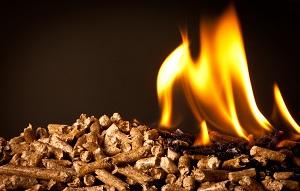Wood energy has been the leading source of renewable energy in the UNECE region for more than a decade, accounting for 35.4% of renewable energy supply for 31 countries, according to the latest results from the UNECE/FAO Joint Wood Energy Enquiry (JWEE). For Austria, Cyprus, Finland, France, Germany, Ireland, Luxemburg, Serbia, Slovenia, Sweden, Switzerland and the United Kingdom, which consistently reported to JWEE over the last 10 years, total wood energy consumption increased from 193 million m³ in 2007 to 265 million m³ in 2017.
While wood removals from forests and other wooded areas historically represented the largest source of wood energy, this trend is showing signs of decline. Over half (50.9%) of the wood fibres used for energy generation in the 31 countries reporting to the JWEE come from indirect sources, mainly by-products and residues from the forest-based industries, such as sawdust, chips, or black liquor and processed wood-based fuels such as pellets. Direct supplies of wood from forests and other wooded areas account for one-third of all wood fibres used for energy purposes in these countries.
Some countries with both a strong forest industry (e.g. Austria) and with little forest at all (e.g. Cyprus) rely mainly (60% or more) on wood supply from indirect sources. The United States, Finland, Sweden and Canada have large shares of energy generated from black liquor, reflecting the relative importance of the pulp and paper industries.
Wood pellets have soared in popularity across the region. In countries which consistently provided data for the past decade, the wood pellets consumption marked an increase from 16.2 kg consumed per capita in 2007 to 55.2 kg consumed in 2017. In countries such as Belarus, Bosnia and Herzegovina, Canada, Croatia, Estonia, France, Ireland, the Netherlands, Serbia, Slovak Republic, Slovenia, Switzerland and the United Kingdom, on average, over 75% of the wood fibre used for wood pellets comes from indirect sources.
Overall, recovered post-consumer wood (mainly wood waste from construction, but also packaging and old furniture) accounts for only 5.3% of wood energy. It is principally consumed in power applications and waste-to-energy plants. In general, however, data on recovered wood is difficult to obtain and often not discernible from generic waste statistics. It is reported as a significant source of wood energy in Germany, Ireland, the Netherlands and Switzerland.
The JWEE also show that the consumption of wood energy is split relatively equally between industry and other final consumers. Among final consumers, the residential sector accounts for almost 90% of total wood energy consumption, especially in countries with a high share of rural populations. Countries with important forest industries, such as Bosnia and Herzegovina, Canada, Finland, Sweden and the United States have a higher share of industrial consumption, whereas Belarus, Estonia, Ireland, Lithuania, Luxemburg and the United Kingdom reported the highest shares of wood energy used in the power and heat sector.
These trends can best be seen at the national level using the country profiles at http://www.unece.org/forests/jwee, along with a more complete analysis with graphs and a database of all available information.
The UNECE/FAO continues to carry out the JWEE, with the latest round of data collection launched in December 2020. Understanding the amount of wood energy coming from bark beetle-damaged wood and the 10% from “unknown” sources are objectives of the enquiry.
Figure 1

Note to editors
About the Joint Wood Energy Enquiry
31 countries of the UNECE region completed the UNECE/FAO Joint Wood Energy Enquiry for 2017, including Armenia, Austria, Azerbaijan, Belarus, Bosnia and Herzegovina, Canada, Croatia, Cyprus, Czech Republic, Estonia, Finland, France, Georgia, Germany, Iceland, Ireland, Italy, Liechtenstein, Lithuania, Luxembourg, Netherlands, North Macedonia, Norway, Serbia, Slovakia, Slovenia, Sweden, Switzerland, Ukraine, United Kingdom and United States. Founded in 2005, JWEE is a biennial questionnaire that aims to shed light on the role of wood energy in the region and has since become a reference source of information on wood energy.


